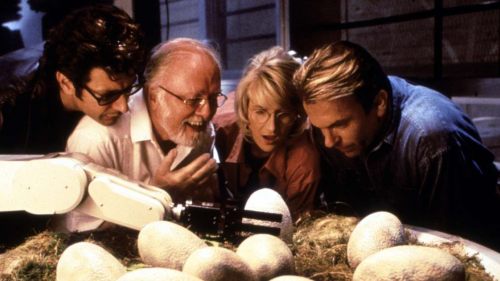Middleburg Film Festival Review: A Powerful Cast Amplifies Familiar Themes In MARRIAGE STORY
There’s certainly no shortage of movies about divorce coming out of Hollywood. We’ve been watching them for decades, from emotional dramas like Kramer vs. Kramer (1979) to more humorous takes on the subject in Irreconcilable Differences (1984) and Mrs. Doubtfire (1993). Even writer/director Noah Baumbach has explored the challenging topic once before in 2005’s The Squid and the Whale, which earned him an Academy Award nomination for Best Original Screenplay. What these movies have in common – besides a series of remarkable performances – is their use of comedy and drama to navigate the emotional turmoil families endure during the process of divorce. While Baumbach’s Marriage Story doesn’t break any new ground on the subject, it follows the tried and true formula of portraying the worst of times with sincerity and humor, filtered through raw and compassionate performances from a talented cast.
Marriage Story follows Charlie and Nicole (Adam Driver and Scarlett Johansson) as they deal with the grueling process of a coast-to-coast divorce. Charlie is a successful stage director in New York on the verge of landing his first Broadway production. Nicole was once a film actress in LA, but she left that all behind to marry Charlie, earning a permanent role as the lead actress in all of his theater productions. Feeling as though she’s lost herself to live out Charlie’s dreams, Nicole auditions for and lands a TV pilot that takes her and the couple’s eight-year-old son, Henry (Azhy Robertson), back to LA to stay with her family. When the move that Charlie believed was temporary escalates into bitter divorce proceedings complete with diabolical lawyers, he faces the all too real and devastating chance of losing custody of Henry. The couple loses perspective of the loving unit they once were as their lawyers (Laura Dern, Alan Alda, and Ray Liotta), focused only on winning, act as the primary voices when it comes to what is best for this family. Tempers flare and lives are forever changed as Charlie struggles to balance his career in New York while maintaining some semblance of a relationship with his son in LA.
Led by Driver and Johansson, the exquisite cast brings new depth to a plot we’ve seen many times before on screen. While it may take some time for viewers to sympathize with Driver’s Charlie as certain truths are brought to light, it’s his character that shows the most growth throughout the film. Driver quietly embodies the frustration of being ambushed by Nicole’s seemingly sudden decisions, slowly erupting into a superbly acted and extremely uncomfortable to watch fight between the couple rivaled only by the volatile argument depicted in Richard Linklater’s Before Midnight. Driver’s magnetic presence enhances every emotional and comedic beat of every scene he’s in, humanizing Charlie in a way that endears him to his family as well as the audience despite his many faults.
Johansson matches Driver’s intensity with a more subdued yet compassionate portrayal of Nicole’s side of the story. But, unfortunately, there are times when Baumbach’s script paints her as the vindictive ex-wife, inhibiting her character until it becomes clear that the divorce is bringing out the worst in everyone. “It’s not as simple as not being in love anymore,” she says, and the more painful truth is that it’s not as simple as who’s right or wrong either. Following the advice of her cutthroat lawyer, Nora (played by the phenomenal Laura Dern), Nicole loses herself in the role of the embittered ex-wife which she never intended to play. Johansson beautifully conveys the strain of attempting to start a new life while trying to hold on to the pieces that matter from the one she’s already built.
Supporting performances from Ray Liotta and Alan Alda as Charlie’s two disparate lawyers boost Baumbach’s signature brand of humor by playfully making light of serious circumstances. Likewise, Julie Hagerty and Merritt Wever as Nicole’s eccentric mother and sister are a delightful distraction from the film’s more somber scenes. But expect applause when Dern steals the show with a fierce monologue about the unreasonably high standards society places on mothers. Every word and scene composed by Baumbach is effectively energized by the collective talents of this brilliant cast.
In the end, Baumbach’s narrative looks beyond how everyone behaves or is affected when a marriage ends to question whether there’s any chance for couples that were once a loving team to salvage some of those feelings in the aftermath. Blending comedy into the tragedy with a side of musical theater – that’s right, the movie features resounding renditions of Stephen Sondheim classics from both Driver and Johansson – Marriage Story imparts hope that families are capable of finding a way to continue their story with love.
Look for Marriage Story in select theaters November 15th and on Netflix December 6th.



